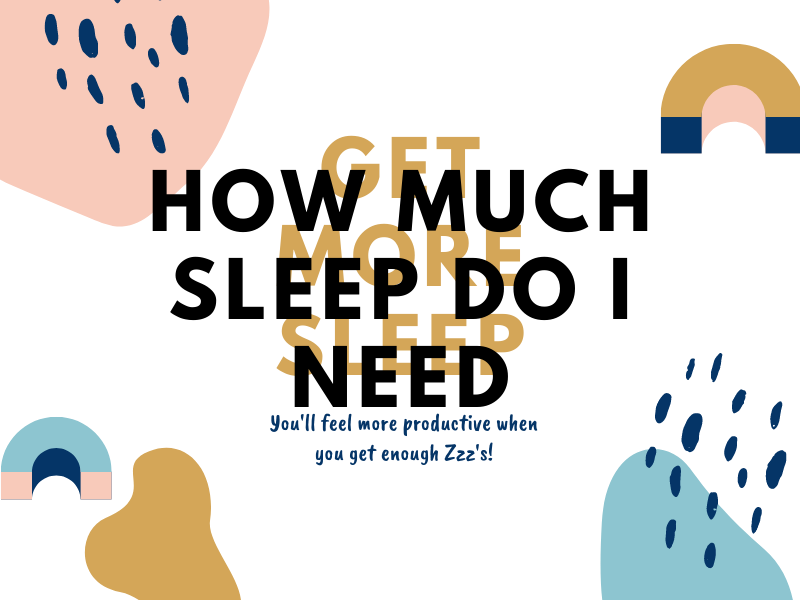When it comes to asking How Much Sleep Do I Need, what’s for sure is that Good sleep is incredibly important to your physical and Mental Health. What’s also evident many people are suffering from lack of sleep which is diminishing their quality of life and performance. good sleep helps you feel good and makes your body and brain function properly.
Is well documented that Some people have no problem falling asleep. However, many others have severe difficulty falling and staying asleep through the night and keep waking up, perhaps a sign of underlying stress and worry.
Asking how much sleep do I need really depends on many factors such as the quality of the sleep. Low quality sleep can have bad effects on many parts of your body and brain, including learning, memory, mood, emotions, and various biological functions (
However, to improve the quality of sleep help is at hand and you can take control and stack the odds in your favour with these 5 simple ways to fall asleep as fast as possible.
6 simple ways to fall asleep as fast as possible
- Lower the temperature. …
- Use the slow deep breathing method
- Regulate your schedule and sleeping patterns and times
- Experience both daylight and darkness. …
- Practice yoga, meditation, and mindfulness.
- Relaxing Music
Lower the Room temperature
Obviously s you warm up under the duvet, it can become uncomfortable, so lowering the room temperature will help you feel cosier and comfortable. Personally, I set the heating to go off one hour before bedtime and come on an hour before waking up, saves money too.
f your room is simply too warm, you might have a hard time falling asleep. Setting your thermostat to a cool temperature among 60–67°F (15.6–19.4°C) ought to assist (four).
Slow Deep Breathing Methods
The “four-7-eight” technique that Dr Andrew Weil advanced is an easy however powerful respiratory technique that promotes calmness and rest.
Have a regular Schedule and Habits
Having a regular time to go to bed can programme your mind to switch off quickly and fall asleep quickly and easily. Although I do understand that in this day and age there is no such thing as a 9-5 job, and people work different shifts. I have a three-shift pattern and every three weeks had to work until 9 pm. So it’s not easy to switch off and get good sleep,
Avoid cat-naps During the Day
If you lucky enough to have them, but some people do snooze in front of the television and it takes the edge off and may distrube your sleeping pattern making it difficult to get deep restfull sleep. If I feel like I am snoozing, and go to bed straightaway.
Eating to Late
Avoid eating to late say 2 hours before going to bed, otherwise it may cause your metabolism to boost up to digest the food. This is the opposite of what you want. Myself I have a slight reflux issue and if I eat too late if really spoils my quality of sleep.
Relaxing Music Video
Conclusiion
In conclusion, the best option is try to regulate your sleeping patterns and proactive some of the good habits given here and many more not mentioned here. So asking How Much Sleep Do I Need? is a difficult to question to answer. Some people feel great on six hours and others need 8 hours and so forth. I really depends on your lifestyle.
The best option is when you feel sleepy go to bed without delay, beacuse your brain is telling you your tired and you need rest.
Please re-visit for more tuseful tips onbetter sleep. e.g. Exercise during the day, Get comfortable, Turn off all electronics,aromatherapy, Practice writing before bed, Limit caffeine and drink a soothing beverage, Adjust your sleep position, Read something, Focus on trying to stay awak, Visualize things that make you happy, Try sleep-enhancing supplement
Sleep Supplements here that can help you fall asleep include:
- Magnesium. Magnesium helps activate the neurotransmitters responsible for sleep. Doses of up to 500 milligrams (mg) per day have been shown to improve sleep. It should be taken with food (74Trusted Source, 75Trusted Source).
- 5-HTP (5-hydroxytryptophan). The amino acid 5-HTP boosts the production of serotonin, which has been linked to the regulation of sleep. Doses up to 600 mg per day, taken either once daily or in divided doses, seem to be effective in treating insomnia (76, 77).
- Melatonin. for sleeping, the body naturally produces the hormone melatonin, but it can also be taken as a supplement to help regulate your sleep. Doses of 0.5–5 mg taken 2 hours before your desired bedtime, which is usually around 8 to 9 p.m. for most individuals, might improve sleep quality (78Trusted Source, 79Trusted Source).
- L–theanine. L-theanine is an amino acid with sedative properties. Although it hasn’t been shown to induce sleep, it could help with relaxation. Doses of 400 mg per day seem to be useful (80Trusted Source, 81Trusted Source, 82Trusted Source).
- GABA (gamma-aminobutyric acid). GABA is a compound produced in the brain. It inhibits certain transmitters and may help the central nervous system relax. Doses of 250–500 mg and no more than 1,000 mg are recommended (83).
For More Information On Sleep Articles and Information Please subscribe below:-


0 Comments